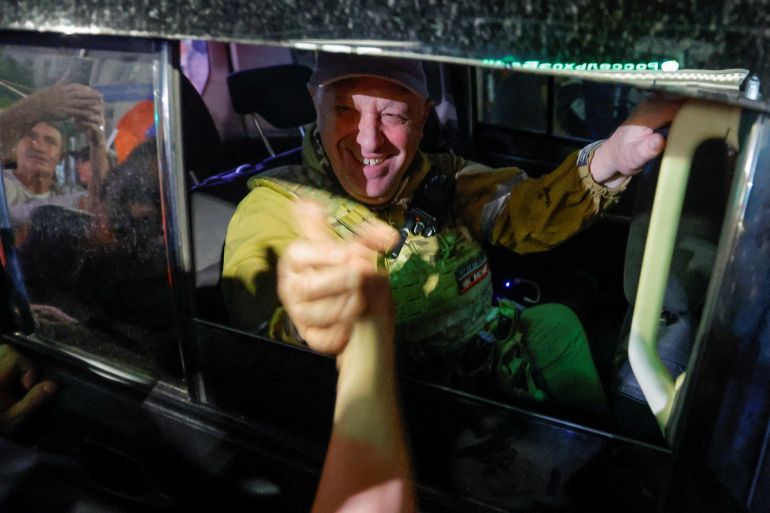After brief exile in Belarus, Wagner boss in Russia: Lukashenko
Mercenary chief Yevgeny Prigozhin is back in Russia less than two weeks after leading rebellion, according to the Belarusian president.

Belarusian President Alexander Lukashenko, who last month brokered a deal to end Wagner’s mutiny in Russia, has said that its leader, Yevgeny Prigozhin, was no longer in Belarus.
Lukashenko said on June 27 that Prigozhin, whose fighters briefly captured a southern Russian city and marched towards Moscow, had arrived in Belarus as part of the June 24 deal that defused the crisis.
Keep reading
list of 4 itemsDrone attacks hit Wagner base in Libya; no casualties reported
After mutiny, clouds hover over Wagner’s operations in Africa
Putin reassures Asian nations of stability after Wagner mutiny
But addressing reporters on Thursday, he said: “As for Prigozhin, he’s in St Petersburg. He is not on the territory of Belarus.”
A business jet linked to Prigozhin left St Petersburg for Moscow on Wednesday and headed for southern Russia on Thursday, according to flight tracking data, but it was not clear if the mercenary chief was on board.
Lukashenko said an offer for Wagner to station some of its fighters in Belarus – a prospect that has alarmed neighbouring NATO countries – still stands. He said he did not see it as a risk to Belarus and did not believe Wagner fighters would ever take up arms against his country.
After Lukashenko’s announcement, the Kremlin said it was not tracking Prigozhin’s movements.
Kremlin spokesman Dmitry Peskov told reporters that no date had yet been set for a meeting between President Vladimir Putin and Lukashenko, and said he could not yet confirm details of what would be on the agenda.

Lukashenko has spoken proudly of his role in ending the mutiny, which Putin has said could have plunged Russia into civil war. Last week, Lukashenko said he had persuaded Putin not to “wipe out” Prigozhin.
But much remains unclear about the terms of the deal Lukashenko brokered and whether it is being implemented as agreed.
Russian state TV on Wednesday launched a fierce attack on Prigozhin and said an investigation into what had happened nearly two weeks ago was still being vigorously pursued.
Journalist Yulia Shapovalova told Al Jazeera from Moscow that according to Lukashenko, the movement of mercenary fighters into Belarus depends on the Wagner management and Russian authorities.
Lukashenko said he was “absolutely not worried” about Wagner forces in his country, said Shapovalova.
March on Moscow
The rebellion saw Wagner forces sweep into the southern city of Rostov-on-Don and capture military headquarters there before marching towards the Russian capital in what Prigozhin described as a “march of justice” to oust Defence Minister Sergey Shoigu and chief of the general staff Valery Gerasimov.
Prigozhin said his fighters had come within 200km (124 miles) of Moscow when he ordered them to stop the advance under the deal brokered by Lukashenko.
The abortive rebellion represented the biggest threat to Putin in his more than two decades in power and exposed weakness in the Kremlin.
Lukashenko’s statement on Thursday followed Russian media reports that said Prigozhin was spotted in St Petersburg, Russia’s second largest city. Those reports cast his presence as part of agreements that allowed the billionaire to finalise his affairs there.
Lukashenko said the issue of relocating Wagner forces had not yet been resolved, the TASS news agency reported.
The Belarusian president also hit out at the West over the Ukraine war and said it was likely that Kyiv would try to demonstrate its power against Russia before a key NATO summit in Lithuania next week, TASS reported.
He was quoted as saying nuclear weapons would only be used in Ukraine in the case of possible NATO “aggression”.